Commercially Pure Titanium Grade 2 | UNS R50400 Guide
 Oct 07,2024
Oct 07,2024

Are you eager to know about a versatile material named CP titanium grade 2? In this article, you will learn about the mechanical, physical, and high-demand usage in several industries and manufacturing units. So, without wasting any time, let’s explore this highly anticipated commercially pure titanium.
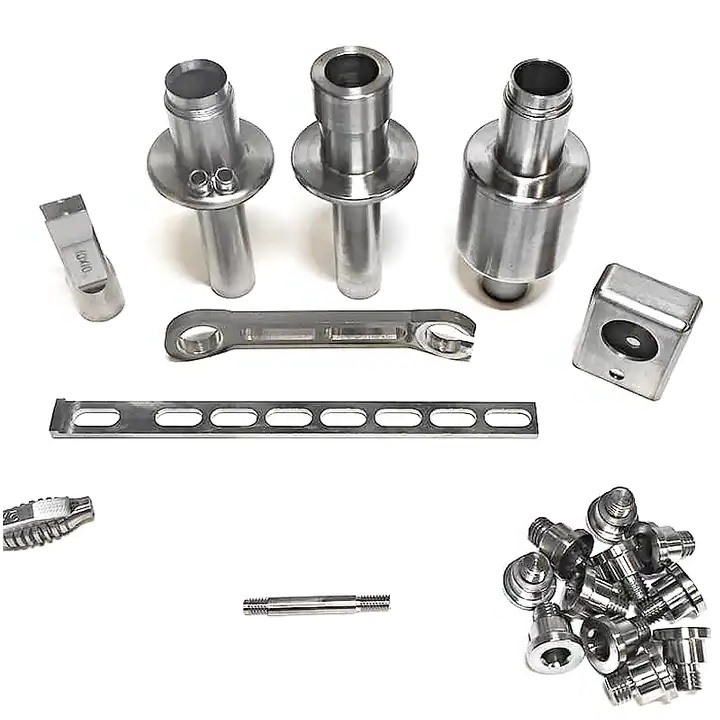
Fig 1: CP titanium grade 2
What is Grade Titanium 2?
It is a commercially pure attractive grade that is abundantly used in several industrial applications. Its wide usage is due to its properties that include good ductility, corrosion resistance, formability, and favorable where lightweight is desired.
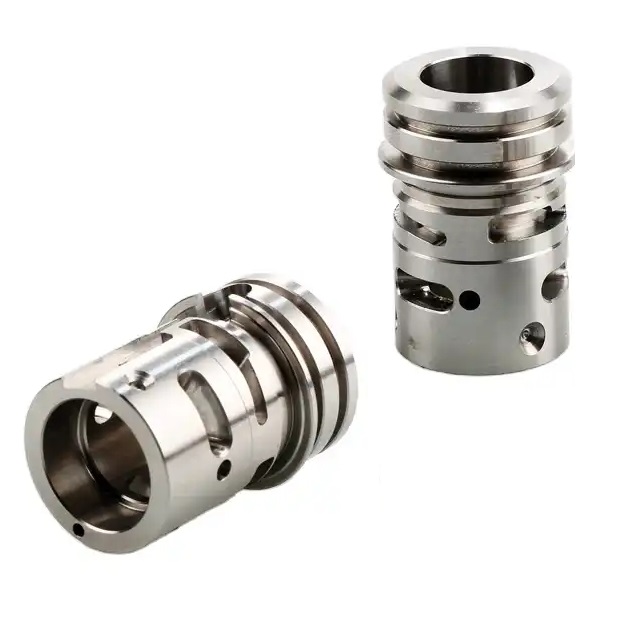
Fig 2: Grade titanium 2
Is Grade 2 Titanium Good?
Yes, this material is considered exceptional for its several properties such as good formability, excellent corrosion resistance, lightweight, and ductility.
Does Grade 2 Titanium Scratch Easily
CP grade 2 titanium has no doubt many properties that make it favorable for the manufacturer to use for different purposes however, this grade is often more prone to scratching as compared to other CP grades of titanium and stainless steel.
Is Grade 2 Titanium Waterproof?
This grade of titanium is surely waterproof due to its resistance to seawater and most importantly, the formation of passive film allows this material to be utilized in such conditions that are exposed to water including marine industry.
CP Grade 2 Titanium Properties
The following are the important properties of CP grade 2 titanium:
- Formability
- Corrosion resistance
- Lightweight
- Good ductility
What is the Titanium Grade 2 Equivalent to?
Titanium Grade 2, also known as Commercially Pure Titanium (CP), It has several equivalent designations in different standards:
| Country | Name | Standard |
|---|---|---|
| Russia | ВТ1-0 (VT1-0) | GOST 19807-91 |
| Germany | 3.7035 | Werkstoffnummer (3.7035) |
| Europe | Titanium Grade 2 | EN 10204-3.1 |
| Japan | Class 2 Titanium | JIS H 4600 |
| China | TA2 | GB/T 3621-2007 / GB/T 13810-2007 |
| United States | Titanium Grade 2 | ASTM B348 / B265 / B337, UNS R50400 |
What is Titanium Grade 2 Used for?
This grade is mainly used for the following purposes mentioned below:
- Titanium grade 2 flanges
- heat exchangers
- titanium plate grade 2
- 2 titanium tubing
- CP grade 2 titanium bar
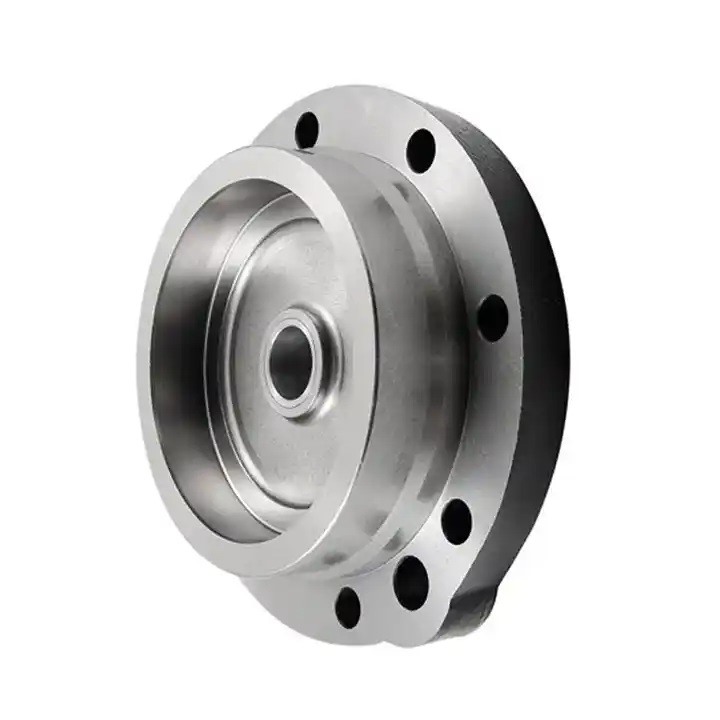
Benefits of Using Grade 2 Titanium UNS R50400
The below schematics demonstrate the important benefits of using Grade 2 titanium:
- Bioconpatibility
- Very low thernal expansion
- High heat transfer efficiency
- High strength
- Resistance aginst pitting and crevice
- corrosion
- Excellent corrosion resistance
- Good weldability

UNS R50400 Equivalent
UNS R50400 comprises of following equivalents listed below:
- DIN 3.7035
- GOST BTI-0
- BS 25-35t/in2
- JIS Class 2
- TA2
Titanium Grade 2 Specification astm b265 grade 2
The table below illustrates the specifications of the following material:
Table 1: Ti Grade 2 specs
|
Specification |
Significance |
|
Condition |
Annealed |
|
Product form |
Strip, sheet, plate |
|
Composition |
Fe, O, C, N, H, Ti |
|
Tensile properties |
50 ksi tensile, 20% elongation, 40-65 ksi yield |
Corrosion Resistance of Titanium Grade 2
The corrosion resistance for CP grade 2 is exceptionally good and much more than stainless steel. This material is suited best for seawater and atmospheric corrosion which is due to the formation of a passive layer on its surface. Moreover, it resists pitting and crevice corrosion.
Titanium Grade 2 Chemical Composition
Below is the chemical composition of CP grade 2 titanium:
Table 2: Chemical composition
|
Alloying element |
%age composition |
|
Fe |
0.30 |
|
O |
0.25 |
|
C |
0.03 |
|
N |
0.03 |
|
H |
0.015 |
|
Other Elements |
0.40 |
|
Ti |
Balanced |
Physical Properties
This grade of titanium possesses the following physical properties described below:
Titanium Grade 2 Density
4.51 g/cm³ is the density for CP grade 2 titanium.
Thermal conductivity
16 W/m·°C is the thermal conductivity for this grade making it suitable for applications demanding high thermal performances.
Electrical conductivity
2.4 x 10^6 S/m is the electrical conductivity of grade 2 titanium making it more favorable for non-conductive applications.
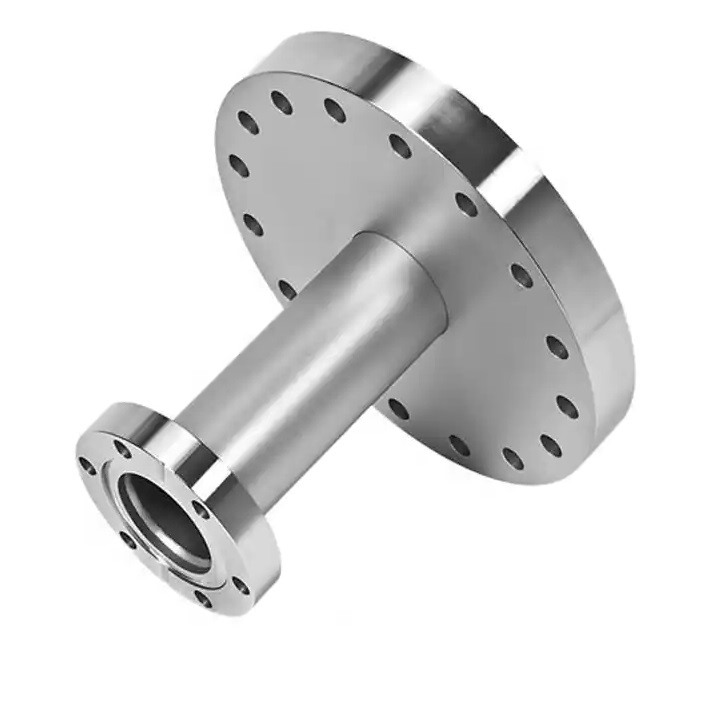
Mechanical Properties of Titanium Grade 2
Cp grade 2 titanium acquires the following physical properties that are briefly discussed one by one below:
Hardness
The table shows the typical hardness values for this material:
Table 3: Hardness Values
|
Hardness |
Value |
|
Knoop hardness |
145-170 KHN |
|
Rockwell hardness |
70-79 HRB |
|
Vicker hardness |
160-200 HV |
Strength
This material is suitable for applications that require moderate strength.
Ductility
With a 20% elongation and a 30% usual reduction in area, this material is known to possess good ductility.
Tensile strength
344 MPa is the approximate tensile strength for CP grade 2 titanium responsible for maintaining the structural integrity of your applications.
Yield strength
275 MPa is the yield strength value for grade 2 titanium.
Elongation
Grade 2 titanium is capable enough to deform plastically with elongation up to 20%.
Ultimate tensile stress (UTS) of lowest and highest
345 MPa is the lower UTS value and 485 MPa is the higher UTS value for CP grade 2 titanium.
Try Tuofa Now!
Send drawings to info@tuofa-cncmachining.com
Real human quotes are more accurate than software quotes
Applications of Titanium Grade 2
This material covers applications from several industries mentioned below:
- Aerospace industry
- Medical sector
- Marine industry
- Chemical processing
- Automotive industry
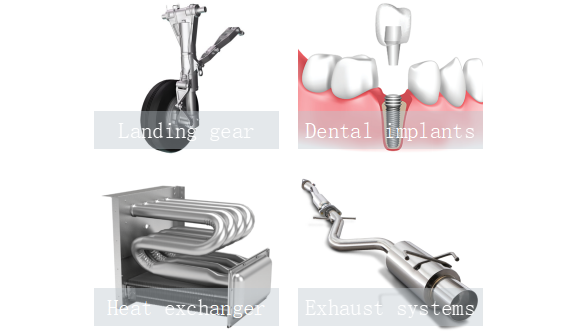
Fig 3: Applications for CP grade 2 Ti
Grade 2 Titanium vs Stainless Steel
Below is a brief comparative analysis of both materials:
Table 4: CP grade 2 Ti vs SS
|
Specs |
Grade 2 titanium |
Stainless steel |
|
Composition |
Commercially pure titanium alloy |
Alloy with major alloying elements including Cr, Ni, and Mb. |
|
Corrosion resistance |
Excellent |
Lower than grade 2 Ti |
|
Strength-to-weight ratio |
Higher |
Lower |
|
Cost |
More expensive |
Less expensive |
|
Applications |
Aerospace, Chemical processing, and medical devices |
Food processing, automotive parts, and construction |
Grade 2 vs Grade 5 Titanium
The major difference among these materials is described below:
- If we talk about composition, grade 2 is commercially pure with 99% of pure Ti. In contrast, grade 5 comprises aluminum and vanadium along with Ti.
- If we compare strength for both materials, 880 MPa and 950 MPa is the yield strength and UTS value for grade 5 which is much greater strength than that of grade 2.
- In terms of ductility, grade 2 is better.
- The corrosion resistance for grade 2 is much higher than that of grade 5 which is often prone to galvanic corrosion.
- As far as cost is concerned, grade 5 is more expensive due to the presence of other alloying elements in its percentage composition.
Aerospace Grade Titanium Alloy Parts Fabrication of CNC Machining and Welding
CNC machining and welding of aerospace-grade titanium alloy is crucial for fabricating important components for your applications. Hence, the following factors must be considered:
- Precision and Tolerances up to 4 microns
- Mechanical Properties of the material
- Machining challenges i.e., tool wear, heat buildup
- Withstand high and stress temperature variations

For optimized welding, the quality of the weld and the appropriate welding technique is crucial without compromising the integrity of the material part.
 Tel/WeChat:
Tel/WeChat:  Email:
Email: 
 Home
Home

 The Beginner’s Guide to 2205 Duplex Stainless Steel
The Beginner’s Guide to 2205 Duplex Stainless Steel 







